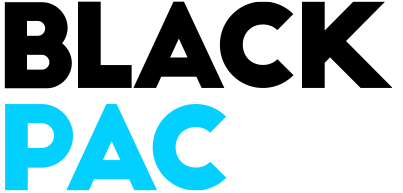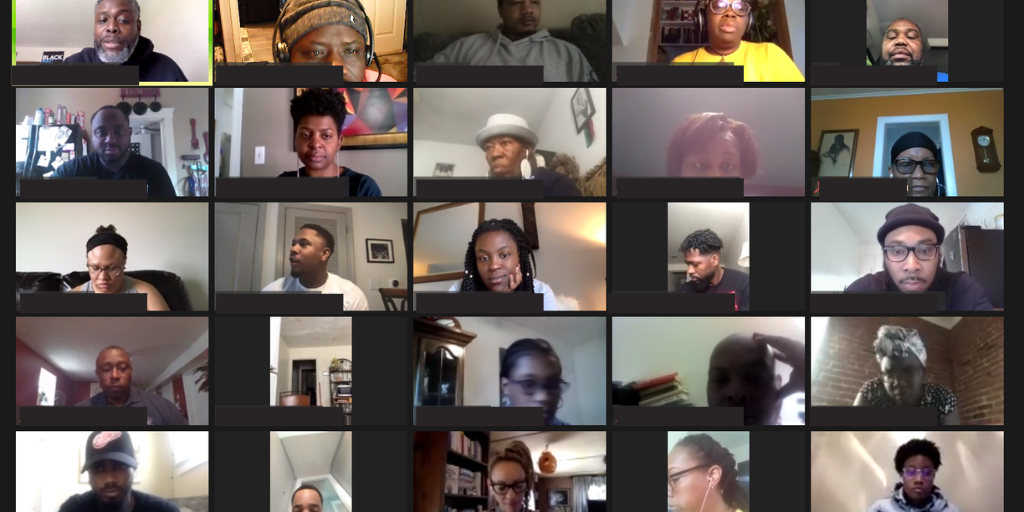Everything about the 2016 presidential election (and the periods leading up to it) through this very day tells us that any sustainable progress for Black people remains at risk and under attack. We’ve all seen the data and continue to live in the reality that Black people, and other people of color, remain disproportionately impoverished, incarcerated, excluded, and vulnerable. While these realities make it hard to live let alone think about voting, in this political moment it is clear that the participation or non-participation of Black people in our democracy will be a deciding factor to the direction and future of the country and with it the direction and future of Black people. Even during a pandemic, it remains necessary that we lift up our role and our responsibility to our community, our families, and ourselves as citizens.
We continue our work year-around of engaging folks where they live and COVID-19 has helped us refine our work in some (un)expected ways.
Erica Clemmons Dean
Organizing Director, New Georgia Project
I have a brilliant, beautiful, and curious 12-year old daughter. For nearly her entire life I’ve been organizing Black and brown communities. This last decade, I’ve traveled extensively to engage community members across the country making sure our voices are heard. This important work has included organizing in our communities after the unadjudicated killing of Black folks at the hands of the police (or other vigilantes) in cities like Ferguson and beyond. In each of these engagements, we’d first organize ourselves through a series of strategic planning meetings beginning with one very important question. What is the low-hanging fruit? Often the answer to the question was building trust and engaging with people face-to-face where they are, where they lived, worked, or fellowshipped.
The unpleasant truth is that there has never been a moratorium on anti-Black violence, not even during a pandemic, so our work – making sure peoples’ voices are heard continues. Remaining safe and healthy is a personal commitment and priority and my life’s work remains critically important in our community. I’ve had more time to be still and reflect and ponder that simple question, what is the low-hanging fruit while living through a pandemic? This required me to think long and hard about how to virtually engage people knowing our greatest strength is being able to physically engage with people face to face. I challenged myself to consider what it would look like and feel like building trust and encourage people to step out on faith virtually, via phone or computer screen.
After a few weeks, it started to become clear as I began to build more awareness of my own internal struggles. I began to notice and pay attention to my own existence within the community not merely as an organizer but also as a contributing member to our community and also needing encouragement to step out on faith. Crystallizing for me that the same community we’re trying to organize is the community we live in and are a part of the day-to-day. We know that when we slow down we better understand how to communicate with community members. This principle still holds true building community both inside our own families as it does outside of our own families.
During this shelter in place moment, I realized that I was missing out on having the unique opportunity and gift to build a real, authentic relationship with my daughter, an integral part of my community. Unfortunately, I hadn’t slowed down enough, until recently, to intentionally build trust and inspire stepping out on faith with my own daughter. It’s become increasingly important to begin and continue having the same conversations with my 12-year-old daughter to explain COVID, how testing is operating, what is and is not a privilege, and the work I do the same way I have done with others for over 10 years.
As organizers when we say “community” we often mean people outside of our homes, outside of our circles. We don’t think of the community as our internal family structure as well. When I was forced to slow down, I realized that we need to incorporate time to build in explanations with our family members. I have a daughter, a husband, siblings, cousins, friends. My organizing should start with them. They live in this community and they are trusted messengers for their communities. I realized that I need to make sure they are equipped with the right information to share with their circle of friends. Continuing to engage the community from the inside, of my family, out is how I now approach organizing.
Charles Douglas III
Director, Brand + Big Ideas, Common Power
For an organization that is built on flying volunteers from Washington State to dozens of other states across the country, one could imagine how much the Coronavirus pandemic has affected our 2020 plans. Additionally, we are a tight-knit community frequently engaged in in-person workshops, lectures, house parties, and potlucks. All of this has shifted to a fully digital organizing approach. Here are some of the successful adjustments we’ve made: shifting our civic volunteer opportunities to be fully online with activity impacting multiple states, launching live podcasts, YouTubing workshops, and moving to Zoom salons for fundraising and Facebook for community engagement.
Given we’re based in Seattle, a major hub for both technology and political donors, the assumption was that this should have all been easy. But we were also the first epicenter of the Coronavirus outbreak, outpacing all other states in both deaths and cases. We were among the first states to temporarily close businesses and implement strict social distancing rules, directly impacting our operating model. It’s easier to look back on it now but there were benefits of this early adversity in Washington State. We were faster to discover and implement solutions, some in our strong medical community, some from the major corporations headquartered here, and some born out of the necessity of community reliance. We, our state, and our individual neighborhoods were the only ones experiencing Coronavirus at this scale so we invented our own solutions. ‘We are all we got’ was very true here in the first few weeks of the COVID-19 outbreak.
It was in these beginning weeks that my daughter was born, my third child, on Primary Election day March 10th here in Washington State foreshadowing the realities of quarantine to come. The political calendar would still move forward even as our community dealt with the effects of Coronavirus and we all had to find new and creative ways to manage and engage with our families. Every parent was homeschooling and providing around the clock childcare. Those who were fortunate enough to still have jobs were juggling their children’s homework and working from home all once and in the same space. I have a newfound respect for the teachers who had to motivate my kids to complete assignments or to do better on tests. It was hard. It was really, really hard.
And yes there’s good from all of this. We’re closer as a family and more aware of each other’s activities, struggles, and victories. There have been really cool moments of overlap, family art projects inspired by schoolwork, or my son looking over my shoulder to learn about operating an organization. In our neighborhood, taking walks is now a common pastime, and we’re all meeting more people than we’ve ever seen on our streets previously. All of this, and Common Power has successfully maintained our action investment nationally, launching a vote by mail advocacy initiative, participating in April and May Wisconsin election GOTV push, and launching new efforts in Georgia, Pennsylvania, Virginia and Arizona. The country too is showing its resilience and focus on the fall election, with Michigan, New Hampshire, Oklahoma, and Virginia setting up a strong vote by mail standards with more states to follow.
If the greatest measure of future success is not what happens to us, but how we respond to it, then our community, our state, and our country are ready for November 2020.
Miguel “Geno” Tucker
Community Leader, Freedom BLOC
Organizers very seldomly get the chance to stop. At the beginning of the COVID pandemic, I was lost. What is my role? How do I help? How do I keep my people alive? I was running around trying to fit into roles I wasn’t best suited for. Then, I just stopped. I fell back and said: let me work on some things I should have already been working on. The things I haven’t had the time to work on because I’ve been running around the city way too much. I finally just sat back and thought and in my mind’s eye envisioned what I really wanted to do.
My goal has always been to create a program for kids to get paid while they learn and have new experiences. What I noticed was that no one was really worried about getting their grass cut. And if they were, they had the additional worry about where their money was coming from. That’s when I came up with a COVID-19 response for lawn care services. To me, this was the perfect opportunity. It just so happened that God was working with me and the first lawn company that I approached with my idea said they’d been trying to figure out how to create an apprenticeship program, to give back to the community.
And there it was, an opportunity for kids to learn and have new experiences. Our plan is to provide lawn care services to seniors and disabled residents in my hood. Kids will get paid $13/hr and supervisors get paid $18/hr, both working up to 30 hours per week. These apprentices will have money that they’ve earned in their pockets. They’ll learn from it. We’re creating future entrepreneurs. We’ll also teach them about saving and spending so basic financial literacy. We’ll also have an online platform where they learn soft and hard life skills, receive mentoring, and mental health professionals providing trauma-informed solutions like mindfulness.
That’s what COVID did for me, did for us. I ain’t gonna lie, it’s one of the best things that has happened to me in this moment of uncertainty. This moment has allowed me to sit back, analyze where I was missing the mark, be intentional, wake up, and really assess what I’m good at? I’m good at connecting people. I can connect the dots that make the puzzle.
That’s pretty much my role. I’m a connector, a middle man, creating these apprentice-type programs for kids to get paid, while also learning valuable skills about work and life. I can say to our children and show them that if they’re hustling now they can learn how to hustle better. They can learn how to move that money to create a legacy for themselves instead of a prison sentence, a number, and a story to come home and tell. I’m tired of hearing stories about a Black young man going to jail and getting 10 years and coming out and changing his life. I’m trying to knock out generational trauma on our families. Let’s avoid the 10-year bid. We want to hear stories about how you grinded for ten years and now you’re a millionaire.


Recent Comments